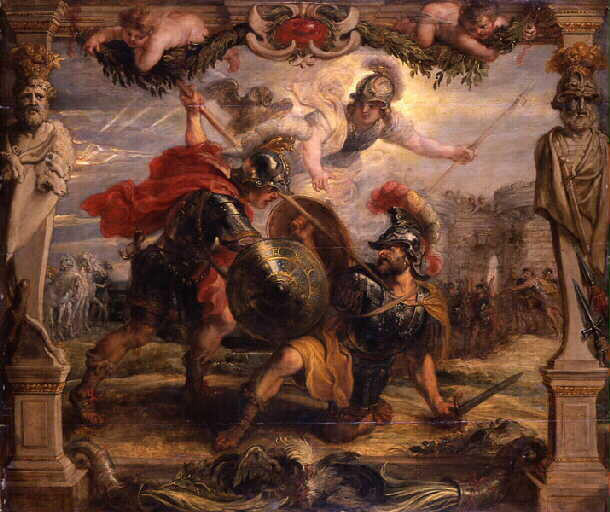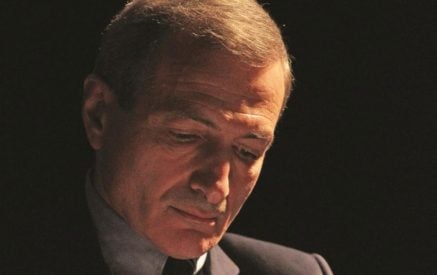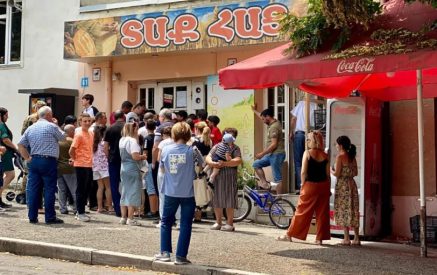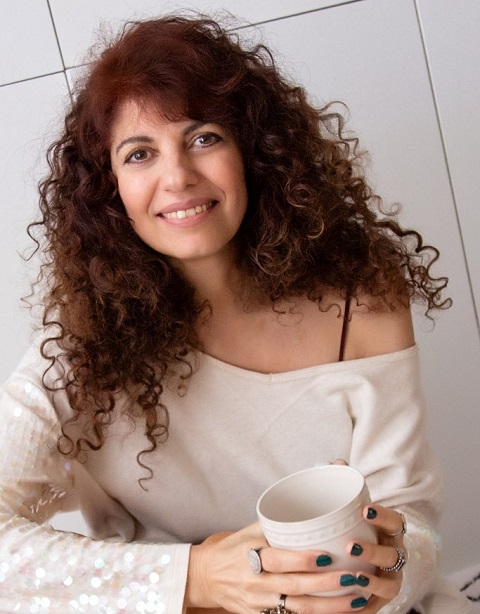There was a war between Armenia and Azerbaijan in the Artsakh Republic, the Armenian name for the Nagorno Karabagh region. I won’t dwell on the political, economic or military aspects of the war, but I will analyze the spirit that is behind the war speech in a zone in dispute, which is an enclave with historical Armenian population found within the territory of Azerbaijan.
By Ana Arzoumanian
Special to the The Armenian Mirror-Spectator
Read also
“There are things that are not said in two languages” – Abbas Beydoun
In one of the translations of the Iliad, Book 1 begins with: “Goddess, sing me the anger, of Achilles, Peleus’ son, that fatal anger that brought countless sorrows on the Greeks, and sent many valiant souls of warriors down to Hades, leaving their bodies as spoil for dogs and carrion birds.”
The traditional title of these verses is “Wrath” (Ménis). Homer narrates Achilles’ wrath in the last year of the Trojan War. After invoking the Muse, he tells that Agamemnon followed Zeus’ plan. Battles, duels, embassies, offerings, assemblies, oaths, speeches, monologues. The epic hero persists, while the poem gives information about the political and social structures, geography, myths and traditions of that time.
The military tactics of the Hoplites, the fights upon chariots, the strength of four horses, the advice to cremate the deceased and bring the bones back home to the children are all composed to be sung orally, but at the same time it is an historical document. Achilles’ wrath narrated by the Iliad is a symbol of the whole war. And the war is between the Trojans and the Achaeans.
There are no clues given as to suggest in which season of the year the battles take place, and the fights are stylized in a way that the rest of the battlefield seems to vanish while the warriors’ hand-to-hand combat takes place. There is a moral content in the behavior attributed to the warriors, a spiritual elevation and humanity in the hero and a desire typical of ancient Greek culture for bringing a rational explanation out of the strife.
The poem begins when the war ends.
This fact reminds me of Theodor Adorno’s question about how to write epic poetry after the horrors of Auschwitz. He questioned himself as if the very writing of epic poetry would be barbarism. Of course we should stop at the “after” in Adorno’s phrase. This is because the trauma caused by a genocide, a Holocaust, doesn’t allow for the transition from a before to an after; the after never arrives.
This School of Frankfurt thinker considered his question, arriving at the conclusion that epic poetry should still be written, but with a determined aesthetic that wouldn’t renew or gratuitously recount that experienced horror.
There is a war between Armenia and Azerbaijan.
There’s a war in Artsakh, the Armenian name for Nagorno Karabagh. I won’t dwell on the political, economic, or military aspects of the war. Nagorno Karabagh is an enclave with a historical Armenian population found within the territory of Azerbaijan, based on the borders determined by Stalin. In the USSR, many territories like Nagorno Karabakh were granted the status of an autonomous region, most of which were plunged into war as the USSR disintegrated, such as Abkhazia, South Ossetia, Crimea, and Transnistria. The Nagorno Karabakh war began as soon as the USSR fell and lasted until the year 1994, when a ceasefire left Armenians in control of most of the territory and established an independent government. This territory included a corridor which connected it to Armenia and with additional territories surrounding Karabakh.
Despite this independence, the Republic of Artsakh received very little recognition from the international community. The ceasefire between the two nations never really went into full effect and in 2016 the conflict erupted into a four-day war, after which the status quo of the ceasefire resumed.
The status quo was shattered for good this September when Azerbaijan started bombing Artsakh’s capital city, Stepanakert, beginning a confrontation which brought with it an immeasurable loss of soldiers and cultural damage in the region.
But the question is: Can we write/say something while the war is happening? Are there words contemporary to action? Are they possible?
The next question would be: Which words are possible to be said while the battlefield is pierced by death?
Words, yes there are some.
Yes, poetic words. Stylized words where honor, dignity, the past of a people, the greatness of a nation, the trauma of a genocide, the following trauma of denial are represented by phrases, “sayings.”
The first saying that appears in a war is: “we are going to win.” Yet nobody considers what it means to win. Territory, dignity, historical reparation? Certainly the equation for winning would be: we lose lives, but we win a national future.
The prime minister of Armenia has called upon all men in the diaspora to join as volunteers in the army to save the motherland, the Armenian Nation. So I think about the fields where words are settled. What’s a nation?
For Armenians, azk is nation and Hayots azk means the Armenian nation or the Armenian people. To understand this term further we would have to think of its derivates: azkanún meaning last name; azkagán: relative; and azkapán: genealogy. In a sense, the notion of a nation or community is intimately bonded to family, but even closer than that, to one’s own name.
For a person in South America the last name (“apellido”) is a family name and to apellidar somebody is to call them by saying their name, to appeal to them, to interpellate them. To call for arms is a distant meaning of the word which, however, puts the accent on the call and not on the national/communitarian aspect.
The discursive discordances also speak about the function that language has in the composition of a social group. In a syntax of domination or from one of struggle, the construction of the symbolic field gives shape not to a political vocabulary but instead to the affections of the members of that group.
The request to join volunteer groups to defend the nation until death leads us to think not only about what a nation is, but also about what death is.
For a person in Argentina, or from South America, immersed in the Western culture, death is the end of life. Death itself is so ungraspable and unspeakable an idea that it leads to the failure of every logical attempt to grasp the idea of how an “I” that lives in the first person only once and never again is offered not an eternal survival in a mythical afterlife, but the realization of a current-life for the mere fact of living, of having lived, which concerns every life. In a way in which death seals the historical meaning of a lifetime and helps shape some idea of the gratuity and the strangeness of life.
The concept of death in Armenia arrives through the legend of a battle which took place in the year 451: the battle of Avarayr, the fight against the imposition of Zoroastrianism and General Vartan Mamikonian’s confrontation with the Persians. The Armenian alphabet had already been created. Armenia was already a Christian nation, but the empire wanted to impose its religion.
Vartan Mamikonian was a prince, a soldier, a general of the Mamikonian family, who legend says descended from the Han dynasty of China, or from other lands of the Chinese empire, or from a region nearer to Afghanistan. What’s known, however, is that a handful of men under the command of this general fighting against the Persian forces were doomed to lose, and indeed they did lose. But yet, not completely.
In the moment before being destroyed by the Persian fire; before the confrontation that would lead to their death, the princely general uttered his famous phrase, a phrase which was embroidered in the armbands of the fighters of the first Nagorno Karabagh war: “Death not understood is death. Death understood is immortality.”
And they fought and they died and they were defeated. But every February, Vartanants is celebrated. Because they were defeated, and yet remained Christian. Vasak Syuni, who advocated trading their Christianity for their lives, is still considered a traitor to this day.
Unconscious death is death, conscious death is… What is a conscious death? A thought-through death, a chosen death. (Which in the West is called suicide?). A deliberate death, a teleology in death, a death as a mean to achieve an end: immortality. Martyrdom. Sacrifice. The reenactment of the Christian passion, but without a body.
Let’s remember Christ dies a man and resurrects; his resurrection is his immortality, becoming the body and blood in the communion given at each Mass: This is my body, he says, and the worshippers in-corporate his grace. The sacrifice of Vartanants is an immortality without a body.
To obey an order, in South America in general, and in Argentina in particular, brings back the memory of the due obedience to military dictatorships. To obey an order has the counterweight of the law and its controls. To obey has for the political vocabulary a bond with justice, what’s just for the judicial “dictum” which carries the forensic imperium of being applied.
To comply with a precept has in Armenia a mythical root: it’s said that when a king died, there was such a commotion that his friends threw themselves into the sepulcher, committing suicide. The king’s son Artavadz begged his father: “you leave and take the whole country with you. Am I supposed to reign over ruins?”.
The dead father hears the pleas of his son and curses him. When Artavadz goes hunting he falls down a cliff and there he lives chained for eternity. In each celebration of Navazart, the Armenian New Year, the blacksmiths open their workshops, stoke the fire and beat the anvil repeatedly with their maces, strengthening the chains that keep Prince Artavadz prisoner. Prison is the end for he who disobeys his destiny.
And here we stumble upon the idea conceived in the Enlightenment as the founding of political framework: responsibility. Modernity with the establishment of law and government of the people makes leaders have to answer to those they represent, both in their work but also through the elections which determine who will lead. Together with the idea of democracy, it consolidated the concept of sovereignty in the head of a Nation-State which extended as empires fell.
The peace of Westphalia created the category of Nation, but it was only after the dissolution of the Ottoman and Austro-Hungarian empires that nations really took on their grandness. In that time the Soviet Empire secured the idea of brotherhood of the homo sovieticus between republics and autonomous regions. The Union fell in 1991, bringing the emblems of modernity to this region at the gates of the year 2000, when the world was opening up to the concept of total war.
In which way and with which elements is a post-Soviet nation built? With which epistemic diagrams? With the notion of destiny and its epic tragic outcome. A fate that does not depend on the action of men but instead is linked to ancestral disputes (hatreds, resentments).
When the prime minister calls for voluntary enlistment he’s calling them to be part of what in Latin America is called paramilitary groups. Those groups, which in Latin America have a mark of excess and outlaw, in the Caucasus are designated under the repertoire of the defense of the blood.
Translating political and military vocabulary into other languages stumbles upon an impossibility: to transplant semantic fields. A language is produced on the battlefield within a culture complete with its myths, its desires, its dreams.
In an interview on North American TV, the interviewer tells the Armenian foreign minister that the government must assure the right to safety of its population (indicating the risk that implies sending its population to the battlefront). However, safety, in the terms of the South Caucasus, is linked to territory.
The contemporary Armenian novelist Vahram Martirosyan titled his novel Landslide, hinting not only at the seismic nature of the zone (recall the major Spitak earthquake of 1988) but also to the shifting of borders.
So the diaspora uses terms that it already comprehends, words that it finds in its own trauma, in its own loss: extermination, genocide, negation. Words that assume absolute victimization, words that admit no negotiation, words that cry for an international penal court or for vengeance.
The words in their associative constellation also conform to the battlefield where the effects of a language over the body are settled.
The poem ends when the war ends.
For those who write, the only thing left is to feel.
Translated by: Diego Ardouin Trento
Editing: Paul Vartan Sookiasian
POST- SCRIPTUM:
This article was written during the Artsakh war. This is the first time it is being published in English.
It was published in Spanish on October 27, 2020 by Cine y Literatura, the first South American cultural digital newspaper in Chile, and a couple of days later in Turkish in the Agos newspaper in Turkey.
Just before the ceasefire, I wrote another article, published in Diario Armenia in Buenos Aires, Argentina, about the misunderstanding of the concept of democracy in the Middle East and the Caucasus.
The word democracy arises from the French Revolution and the beginning of the Modern Era. Since bourgeoisie in the Middle East and in the Caucasus didn’t get to strengthen, the word democracy doesn’t represent those political regimes. Therefore, even though in Armenia the last government started as the “Armenian Velvet Revolution,” it’s not possible to affirm that it’s a strict democracy.
Ana Arzoumanian (bio)
I was born in Buenos Aires in 1962. I am a lawyer, writer and translator. I have completed a postgraduate course on psychoanalysis at Escuela de Orientación Lacaniana. I am a professor at Tres de Febrero University on Creative Writing, and editor-in-chief of the Canoa Literary Collection of Poliedro magazine at San Isidro University.
I have published poetry books: Labios, Debajo de la piedra, El ahogadero, Cuando todo acabe todo acabará, Káukasos, La Jesenská; novels: La mujer de ellos, Mar Negro; stories: “La granada,” “Mía,” “Juana I,” “Del vodka hecho con moras,” “Infieles”; and essays: “El depósito humano: una geografía de la desaparición”; “Hacer violencia. El régimen insurrecto en el arte.”
I have shot a documentary film about Armenian genocide and Argentinian dictatorship in Argentina and Armenia directed by Ignacio Dimattia in 2010, “A-Diálogo sin fronteras” (https://youtu.be/87-zFAvTT0w). I’ve shot also a documentary film about the diaspora in Argentina “Acá y acullá” directed by Hernán Khourian (2015); trailer: https://youtu.be/svyQxw_Wj1c
Main caption: Achilles Slays Hector By Peter Paul Rubens http://www.umich.edu/~homeros/Representations%20of%20Homer’s%20Ideas/Marisa%20-%20Self-identity%20in%20the%20Iliad.htmTransferred from en.wikipedia to Commons by Twice25 using CommonsHelper., Public Domain, https://commons.wikimedia.org/w/index.php?curid=4297556
























































